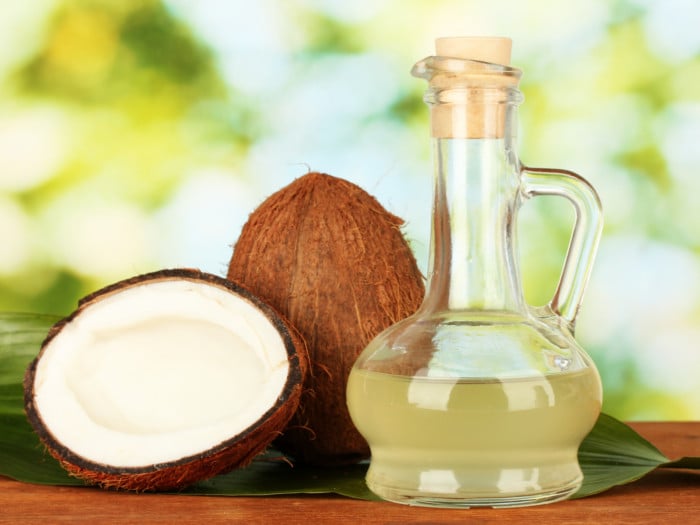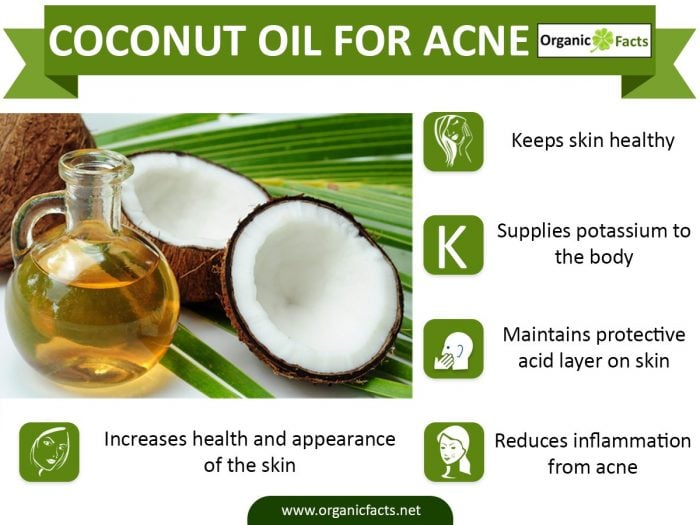Using coconut oil for acne is a very effective treatment, considered by many people around the world. It is rich in beneficial fatty acids and vitamin E and reduces inflammation. This trick is as simple as fighting oil with oil.
What causes Acne?
Acne is caused by an infection in the openings of sebum glands that are microscopic exocrine glands in the skin. These glands secrete various oils to keep the skin moist and prevent it from drying up and cracking. Sebum glands can become clogged by bacteria and the resultant obstruction in sebum secretion is followed by inflammation, redness, swelling, and pain.
Why do Teenagers suffer from Acne the most?
The reason is, during the teenage years, due to certain hormonal changes, sebum production is greatly increased, which gives the skin a slightly oily look. The increase in sebum may lead to pimples or minor acne, but nothing nearly as obvious or painful as full-blown acne. [1]

Coconut oil is as good for your skin as it is for your health. Photo Credit: Shutterstock
Unfortunately, at that point, teenagers often resort to the indiscriminate use of soaps and lotions to remove pimples, which do not stop the oily secretions. They, however, rob the skin of its antimicrobial acid guard, which leaves the pores open and defenseless to infections. These pores become infected by bacteria and dirt blocks the sebum glands. These glands then begin to deposit their sebum beneath the surface of the skin, making it red, puffy, irritated, and painful.
Acne has been a widespread problem among teenagers, but can also affect adults of all ages. Even though the symptoms mostly disappear or decrease once puberty is passed and hormones become more normalized, acne can still be a very painful and awkward condition while it lasts and can leave permanent marks on the face and the body.
Some lucky people are able to get rid of acne without having to spend much time, energy, or money in its treatment, while others may spend a fortune on acne treatment and still don’t get the desired results.
The solution we propose is to use coconut oil as a natural and effective treatment for your acne symptoms. This might strike you as unusual, considering most skin specialists advise people suffering from acne to avoid oils and oily food, but keep reading. There are plenty of good reasons why using coconut oil for acne treatment is a surprisingly effective method and is worth trying before or after the common prescription medicine doesn’t deliver on all of its promises. [2]
Coconut Oil for Acne Treatment
There are a number of nutritive agents in coconut oil that help combat this condition, and the major functions are explained below.
Inhibits Microbial Infection
Coconut oil is a great source of two of the most powerful antimicrobial agents found in food. These two powerhouses are capric acid and lauric acid. When coconut oil is applied to the skin, some microbes (good ones) present on the skin convert these acids into monocaprin and monolaurin, respectively. This helps replace the protective acid layer on the skin, which is removed through constant washing and wiping by acne-affected people. Basically, without the microbial infection, acne cannot develop! Not only the external application but also the internal consumption of coconut oil will give you a similar level of protection. However, a direct application is usually recommended. [3] [4]
Rich Source of Vitamin E

Coconut oil is very effective in fighting acne. Photo Credit: Shutterstock
As per the USDA, coconut oil is a rich source of vitamin E that keeps your skin healthy and ensures the proper functioning of the sebum glands and clears the blockage. This means that coconut oil treats the root cause of acne, not just the symptoms. Vitamin E, a hormone regulating-substance, can reduce some of those natural hormonal fluctuations that lead to the sebum gland becoming hyperactive. [5] [6]
Reduces Inflammation
Coconut oil is soothing to the skin and is highly penetrating, so when it is applied, it is absorbed quickly and begins to immediately reduce the inflammation from acne that is already present. It also helps heal open wounds on the skin from severe cases of acne. Above all, coconut oil improves the rate of metabolism. This also indirectly affects the proper secretion and hormonal balance, thus curbing the chances of developing acne, and increasing the rate of healing and repair of the skin cells damaged by this widespread condition. [7]
As mentioned before, coconut oil can be either topically applied or consumed. Some experts recommend both internal and external use for maximum benefits, and only 2-5 tablespoons are needed each day to have an effect. It can be added to food, or even eaten straight, as it has a pleasant taste.
Choice of Coconut Oil for Acne
You should select the highest quality of coconut oil available for the treatment of acne. The best choice is virgin coconut oil, which has many benefits but is expensive. Unrefined coconut oil contains naturally occurring polyphenols and phytonutrients, which are best for your skin. [8]
You can use carrier oils if coconut oil alone isn’t potent enough to help you. The list of oils is as follows;
- Hazelnut oil – It tones and smoothens the skin
- Grapeseed oil – It hydrates your skin quickly without leaving any grease
- Black cumin seed oil – With its cleansing properties, this oil clears the excess oil on your skin
- Olive oil – It has anti-aging properties and is known to have healing properties
Using Coconut oil for Acne
Topical Application
The best way to use it is by massaging it between hands and letting it liquefy and then gently applying it to your face.
Culinary Use
You can incorporate coconut oil into your diet by adding it to your tea, coffee or stir-fries. People also use it in baking recipes.
Word of Caution: Coconut oil does have a wealth of positive effects on the symptoms, severity, and healing process of acne, but it is still classified as a light-microbial agent. This means that it cannot be your only line of treatment against firmly ingrained or serious cases of acne. You should approach the problem from numerous angles and if you have a severe case of acne, consult a skin specialist before trying any preventive methods such as using coconut oil. Results may vary from person to person depending on their skin type, age, lifestyle, eating habits, and personal hygiene. It should also be remembered that coconut oil is not a cure for acne, simply a treatment.
